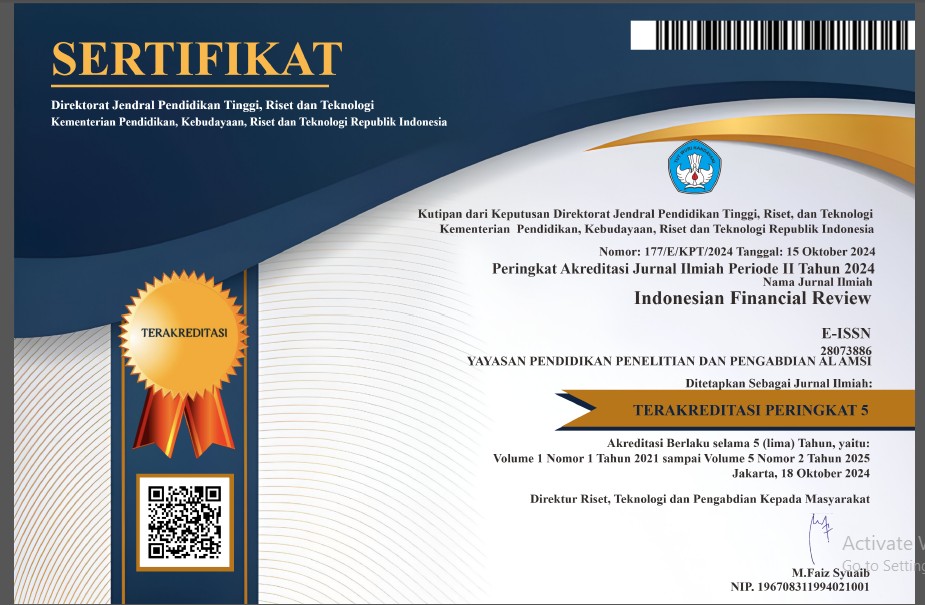COVID-19 and Corporate Cash Holdings in Indonesia
DOI:
https://doi.org/10.55538/ifr.v1i1.2Keywords:
COVID-19, cash holdings, precautionary motiveAbstract
The COVID-19 outbreak highly affected the continuity of public firms. Cash holding decisions are one of the captivating issues in the corporate finance area during the COVID-19 pandemic. This study examines the difference in cash holding levels before and after the COVID-19 pandemic. Public firms included in the LQ45 index are examined. By employing a paired-samples t-test, the results show a significant difference in cash holding level before and after the COVID-19 pandemic exists. This result supports the precautionary motive for saving cash amid the COVID-19. This study implies that the managers should increase the cash holding level during the COVID-19 pandemic.
References
Acharya, V. V., & Steffen, S. (2020). The risk of being a fallen angel and the corporate dash for cash in the midst of COVID. Review of Corporate Finance Studies, 9(1), 430-471.
Acharya, V., Davydenko, S. A., & Strebulaev, I. A. (2012). Cash holdings and credit risk. Review of Financial Studies, 25(12), 3572-3609.
Almeida, H. (2021). Liquidity management during the COVID-19 pandemic. Asia Pacific Journal of Financial Studies, 50(1), 7-24.
De Vito, A., & Gomez, J. (2020). Estimating the COVID-19 cash crunch: Global evidence and policy. Journal of Accounting and Public Policy, 39(2), 1-14.
Fu, M., & Shen, H. (2020). COVID-19 and corporate performance in the energy industry. Energy Research Letters, 1(1), 1-5.
Gill, A., & Shah, C. (2012). Determinants of corporate cash holdings: Evidence from Canada. International Journal of Economics and Finance, 4(1), 70-79.
Harford, J., Klasa, S., & Maxwell, W. F. (2014). Refinancing risks and cash holdings. Journal of Finance, 69(3), 975-1012.
Lian, Y., Sepehri, M., & Foley, M. (2011). Corporate cash holdings and financial crisis: An empirical study of Chinese companies. Eurasian Business Review, 1(2), 112-124.
Opler, T., Pinkowitz, L., Stulz, R., & Williamson, R. (1999). The determinants and implications of corporate cash holdings. Journal of Financial Economics, 52(1), 3-46.
Phan, D. H., & Narayan, P. K. (2020). Country responses and the reaction of the stock market to COVID-19—a preliminary exposition. Emerging Markets Finance and Trade, 56(10), 2138-2150.
Qin, X., Huang, G., Shen, H., & Fu, M. (2020). COVID-19 pandemic and firm-level cash holding-Moderating effect of goodwill and goodwill impairment. Emerging Markets Finance and Trade, 56(10), 2243-2258.
Song, K., & Lee, Y. (2012). Long-term effects of a financial crisis: Evidence from cash holdings East Asian firms. Journal of Financial and Quantitative Analysis, 47(3), 617-641.
Sutrisno, B. (2017). Hubungan cash holding dan nilai perusahaan di Indonesia. Jurnal Dinamika Akuntansi dan Bisnis, 4(1), 45-56.
Sutrisno, B. (2018). Likuiditas dan cash holding di Indonesia. Akuntabilitas, 11(1), 91-104.
Sutrisno, B., & Gumanti, T. A. (2016). Pengaruh krisis keuangan global dan karakteristik perusahaan terhadap cash holding perusahaan di Indonesia. Jurnal Siasat Bisnis, 20(2), 130-142.
Ye, Y. (2018). A literature review on the cash holding issues. Modern Economy, 9(1), 1054-1064.
Downloads
Published
Versions
- 2021-08-18 (6)
- 2022-03-04 (5)
- 2022-03-04 (4)
- 2021-08-18 (3)
- 2021-08-18 (2)
- 2021-08-18 (1)
How to Cite
Issue
Section
License
Copyright (c) 2021 Bambang Sutrisno

This work is licensed under a Creative Commons Attribution 4.0 International License.
















